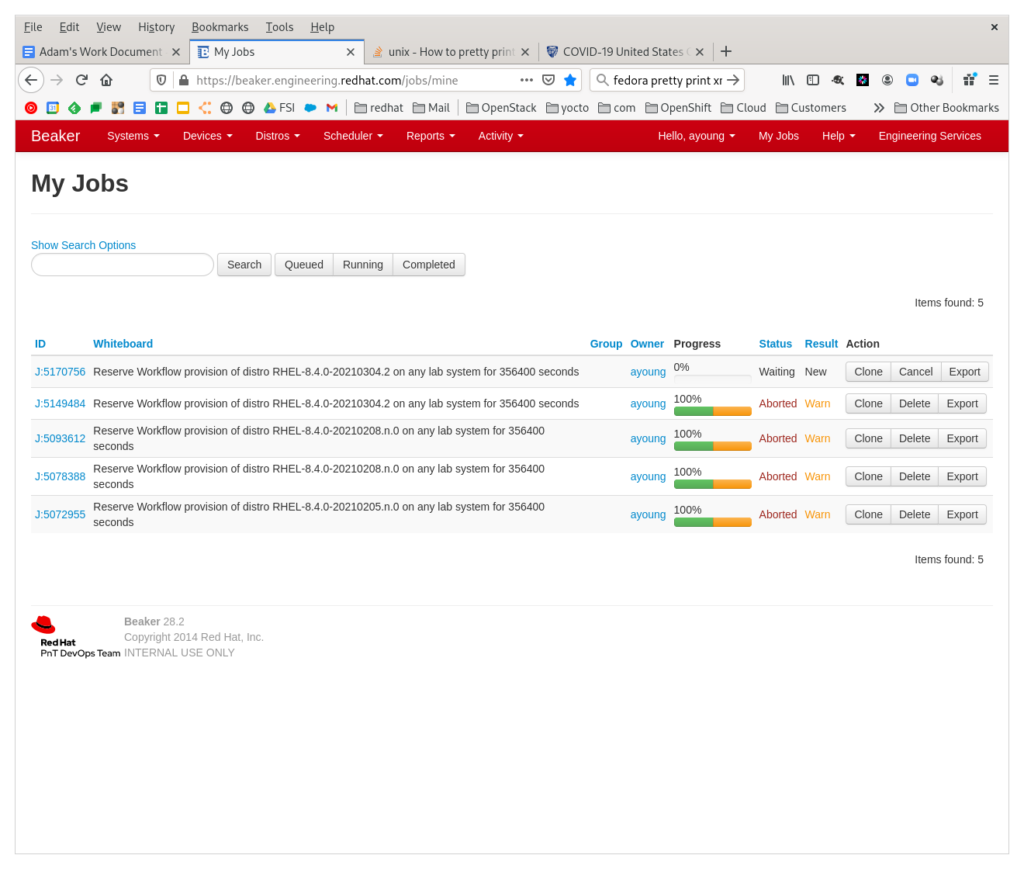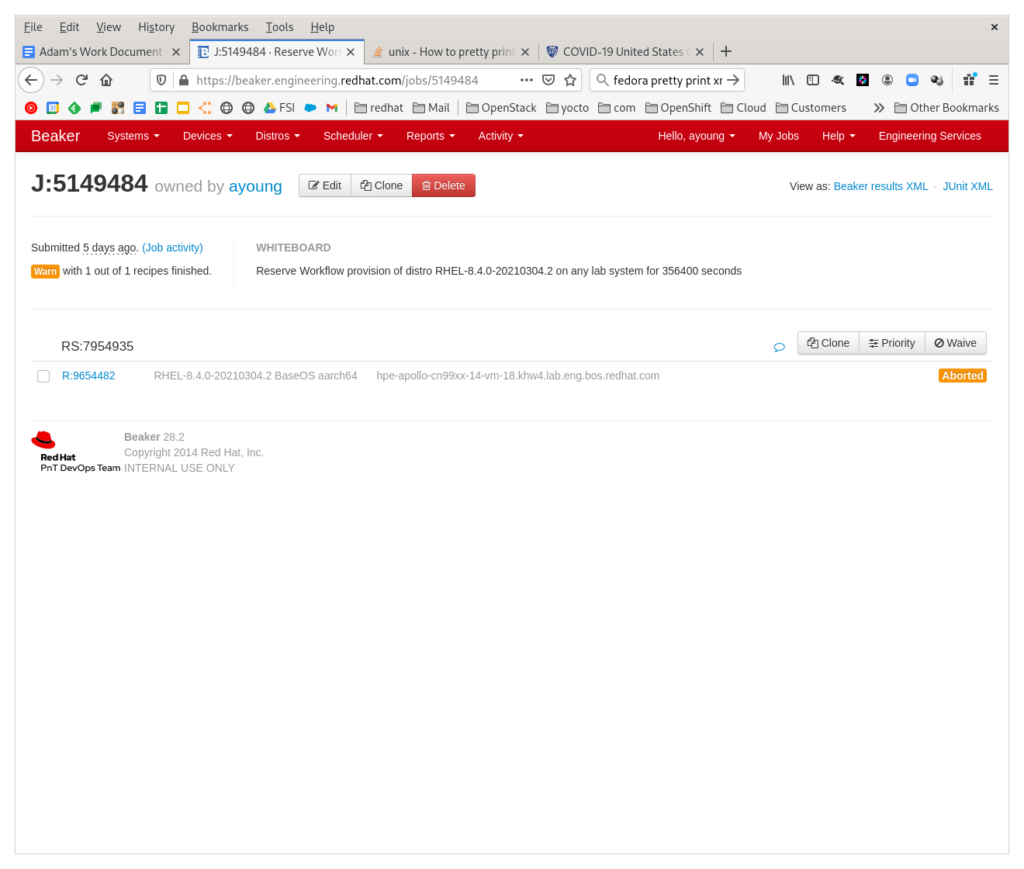A graphical User interface has the potential ability to guide users on their journey from n00b13 to power user. If a user has never used a system before, the graphical user interface can provide a visual orientation to the system that is intuitive and inviting.
Once a user starts to depend on a system and use it regularly, they often want to automate tasks performed in that system.
I am reminded of these principals as I start making use of my company’s beaker server. I need short term access to machines of various architectures develop and test our Yocto based coding efforts.
We have an internal build of beaker that requires a Kerberos ticket. Thus, before I do anything with beaker, I have to:
kinit ayoung@REDHAT.COM |
The reason I have to put in the user principal is because, with my FreeIPA works, I tend to point at multiple KDCs for different domains. For most people, the kinit command alone would be sufficient. Either way, I end up with a ticket-granting-ticket (TGT.)
Once I have a TGT, I can list my jobs.
bkr job-list -o ayoung ["J:5170756", "J:5149484", "J:5093612", "J:5078388", "J:5072955"] |
A regular beaker user will collect a lot of jobs over time. To see if any are not completed:
bkr job-list -o ayoung --unfinished ["J:5170756"] |
I have one. How did I get it? By submitting a clone of an old job. I started by going to the web UI and pulling up my sets of jobs:

If I select any one of them

I can select clone. This gives a page with the xml output from the previous invocation;
<job retention_tag="scratch"> <whiteboard>Reserve Workflow provision of distro RHEL-8.4.0-20210304.2 on any lab system for 356400 seconds</whiteboard> <recipeSet priority="Normal"> <recipe whiteboard="" role="RECIPE_MEMBERS" ks_meta="" kernel_options="" kernel_options_post=""> <autopick random="false"/> <watchdog panic="ignore"/> <packages/> <ks_appends/> <repos/> <distroRequires> <and> <distro_family op="=" value="RedHatEnterpriseLinux8"/> <distro_variant op="=" value="BaseOS"/> <distro_name op="=" value="RHEL-8.4.0-20210304.2"/> <distro_arch op="=" value="aarch64"/> </and> </distroRequires> <hostRequires> <labcontroller op="=" value="lab-02.rhts.eng.bos.redhat.com"/> <system_type op="=" value="Machine"/> </hostRequires> <partitions/> <task name="/distribution/check-install" role="STANDALONE"/> <task name="/distribution/reservesys" role="STANDALONE"> <params> <param name="RESERVETIME" value="356400"/> </params> </task> </recipe> </recipeSet> </job> |
If I save that to a file I can re-invoke it from the command line:
bkr job-submit ansible4yocto/playbooks/files/beaker-aarch64-rhel.xml |
Now I want to query my set of jobs, but only show ones that are not finished.
bkr job-list -o ayoung --unfinished ["J:5170756"] |
To inspect this job, I can pull the ID out using jq.
bkr job-list -o ayoung --unfinished | jq -r ".[]" J:5170756 |
To see the details of it, I can use the bkr job-results command, but it comes back as a lot of XML. I can use xmllint to make it more legible.
bkr job-results J:5170756 | xmllint --format - | head -2 <?xml version="1.0"?> <job id="5170756" owner="ayoung@redhat.com" result="Pass" status="Running" retention_tag="scratch"> |
And use xpath to pull out a subsection. To see the whiteboard;
bkr job-results J:5170756 | xmllint --format - | xpath -e /job/whiteboard Found 1 nodes in stdin: -- NODE -- <whiteboard>Reserve Workflow provision of distro RHEL-8.4.0-20210304.2 on any lab system for 356400 seconds</whiteboard> |
How about to figure out if the machine has been allocated and provisioned?
(I am going to use a touch of sed to make the results more readable)
$ bkr job-results J:5170756 | xpath -e /job/recipeSet/recipe/task/results/result | sed 's!>!>\n!g' Found 3 nodes in stdin: -- NODE -- -- NODE -- <result path="/distribution/check-install" start_time="2021-03-09 13:49:35" score="426" result="Pass" id="574797323"> None<logs> <log href="https://beaker.engineering.redhat.com/recipes/9684128/tasks/123051487/results/574797323/logs/dmesg.log" name="dmesg.log" /> <log href="https://beaker.engineering.redhat.com/recipes/9684128/tasks/123051487/results/574797323/logs/avc.log" name="avc.log" /> </logs> </result> -- NODE -- <result path="/distribution/check-install/Sysinfo" start_time="2021-03-09 13:49:35" score="None" result="Pass" id="574797325"> None<logs> <log href="https://beaker.engineering.redhat.com/recipes/9684128/tasks/123051487/results/574797325/logs/avc.log" name="avc.log" /> <log href="https://beaker.engineering.redhat.com/recipes/9684128/tasks/123051487/results/574797325/logs/resultoutputfile.log" name="resultoutputfile.log" /> </logs> </result> <result path="/distribution/reservesys" start_time="2021-03-09 13:50:35" score="0" result="Pass" id="574797547"> None<logs> <log href="https://beaker.engineering.redhat.com/recipes/9684128/tasks/123051488/results/574797547/logs/avc.log" name="avc.log" /> <log href="https://beaker.engineering.redhat.com/recipes/9684128/tasks/123051488/results/574797547/logs/resultoutputfile.log" name="resultoutputfile.log" /> </logs> </result> |
We can see the status of the reservesys and check-install tasks. What is the name of the system that I have been allocated?
$ bkr job-results J:5170756 | xpath -e /job/recipeSet/recipe/roles/role Found 1 nodes in stdin: -- NODE -- <role value="RECIPE_MEMBERS"><system value="hpe-apollo-cn99xx-15-vm-19.khw4.lab.eng.bos.redhat.com"></system></role> |
If I want to use this in some other script:
bkr job-results J:5170756 | xpath -q -e string\(/job/recipeSet/recipe/roles/role/system/@value\) hpe-apollo-cn99xx-15-vm-19.khw4.lab.eng.bos.redhat.com |

interesting